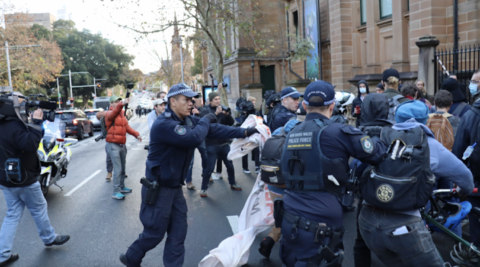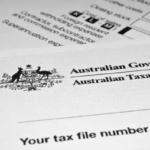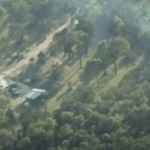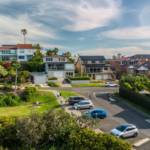The Crackdown on Climate Defenders Will Result in an Escalation in Tactics
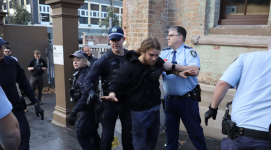
The Perrottet government jamming through the most draconian protests laws in the nation over a 48 hour period in March, reveals that the “climate wars” that the new prime minister promised to end on taking office two months later, have only just begun.
The line spun on AM talkback radio used as a pretext to enact the laws was that an hour delay in peak hour traffic due to protesters raising climate awareness is more detrimental than any of the extreme weather events coal and gas use are causing locally, regionally or on a global scale.
But the authorities are well aware that the climate crisis is upon us. They’ve been present for this year’s dramatic rainfalls and repeated floods. They witnessed the forests burn down over the summer of 2019-20. And they’re doing their darndest to keep the link to fossil fuels suppressed.
The unauthorised nonviolent direct actions taken by activists over the last year marked a shift in tactics, as despite officially sanctioned mass climate mobilisations over previous years, governments have continued to shirk at taking adequate climate action in favour of the resource industry.
So, whilst the weather gets worse and the calls to phase out fossil fuels grow, Australian governments are turning to increasingly draconian measures to silence those opposing corporations, which, as it obviously won’t solve the problem, will certainly serve to escalate the demonstrations.
Adding fuel to the fire
“As a response to that heightened level of direct action that comes out of the frustration and need to force change, the government is going the wrong way again,” Tim O’Donnell said of the new laws. “They’re making things tighter and tighter. It’s pushing things, more and more, to the extreme.”
O’Donnell is the father of climate defender Max Curmi, who was arrested during a questionable police raid at a Colo property in June and was subsequently remanded for three weeks, along with a fellow activist, despite neither of them posing any real threat when taken into custody or in general.
According to O’Donnell, the rising criminalisation of climate defenders won’t silence those trying to save the planet, rather it’s likely to heighten the nature of their protests. And he’s aware of others now contemplating unauthorised action after witnessing the recent heavy-handed suppression.
Curmi was gaoled over his involvement in a series of Blockade Australia nonviolent climate actions that were about to take place in Sydney’s CBD. And the NSW Police Force, apparently emboldened by the new laws, went on to use extreme force and measures never seen before in stamping it out.
To stymie the tide of change, NSW police staked out the camp at the Colo property pre-protest, raided it twice and stopped activist cars or visited them at home to have a chat. Post demonstration saw participants picked off the street, arrested in public and a picnic meeting in a park was stormed.
“It’s reminiscent of what we saw in Hong Kong. People are being followed two days after and being arrested in cafes for doing little more than walking on a road,” O’Donnell told Sydney Criminal Lawyers. “It’s pretty full on, and a lot of people don’t know those details.”
Questionable punishment
The crackdown on nonviolent climate defenders took a steep incline last November when, following his participation in Blockade Australia actions targeting Newcastle Coal Port, activist Sergeio Herbert was sentenced to 12 months prison time immediately when turning up in court.
This set a precedent that saw activist Max Curmi sentenced to four months gaol time in March due to a disruptive action he carried out at Sydney’s Port Botany. While Fireproof Australia’s Andrew George was sent away for 3 months for running onto a football field during an NRL match.
All of these sentences have since been dropped on appeal, which raises questions as to whether short stints in gaol that won’t stand up to a legal challenge, as well as periods on remand and the imposition of harsh bail conditions, are all being used to punish in a manner that’s unwarranted.
The death of protest
In regard to the Perrottet government enacting its anti-protest regime in record time, NSW Greens MLC Abigail Boyd said it’s “the most draconian thing I’ve ever witnessed in NSW parliament”. She added that the “antidemocratic” process provided little consultation and abandoned debate.
After a road blockage protest made NSW roads minister Natalie Ward late for work, she tweaked section 48A of the Roads Regulation 2018 (NSW) on 24 March, so the offence of obstructing the Sydney Harbour Bridge was broadened to all bridges and tunnels.
This crime, contained in section 144G of the Roads Act 1993 (NSW), was further amended via legislation introduced by the attorney general a week later, so that it also includes the obstruction roads, whilst an additional offence was created that criminalises blocking access to major facilities.
So, the unauthorised obstruction of a road, bridge, tunnel or a major facility, such as a train station, now sees activists facing imprisonment of up to 2 years and/or a $22,000 fine. Prior to this the usual charge was the summary offence of obstructing traffic, which carries a fine of $440.
As Melbourne Activist Legal Support (MALS) recently pointed out, NSW is not the only state trying to eradicate climate action, as Tasmania last month passed its own regime which sees protesters obstructing a business facing up to 12 months inside and/or an $8,650 as its baseline sanctions.
While the Andrews government is currently deliberating upon laws to prevent protesters obstructing logging operations in Victoria. These laws carry penalties of up to 12 months prison time and/or a $21,000 fine.
A pressure cooker
The disconnect with the approach government and law enforcement are taking to nonviolent climate defenders and the reality on the ground was highlighted at the recent Blockade Australia demonstrations in Sydney’s CBD, when a man drove his car straight into protesters.
Captured on film, the Bondi man, who’d been temporarily blocked in peak hour traffic, drove into demonstrators, ramming into some of them, and only received a fine of $469. This criminal act that endangered lives was basically shrugged off because the potential victims were activists.
But slapping further sanctions on protests is hardly going to end them, especially as the IPCC has warned that unless immediate action is taken, “limiting warming to close to 1.5°C or even 2°C will be beyond reach”. Indeed, a post-COP26 analysis outlines we’re heading for 2.4°C warming
“Good luck to the government if they think they’re going to shut down climate action, because they’re not going to,” O’Donnell said, soon after his son Max was released on bail last Tuesday.
“And the more punitive they get, the more action there’s going to be. So, they’re just not going to succeed in that line.”
